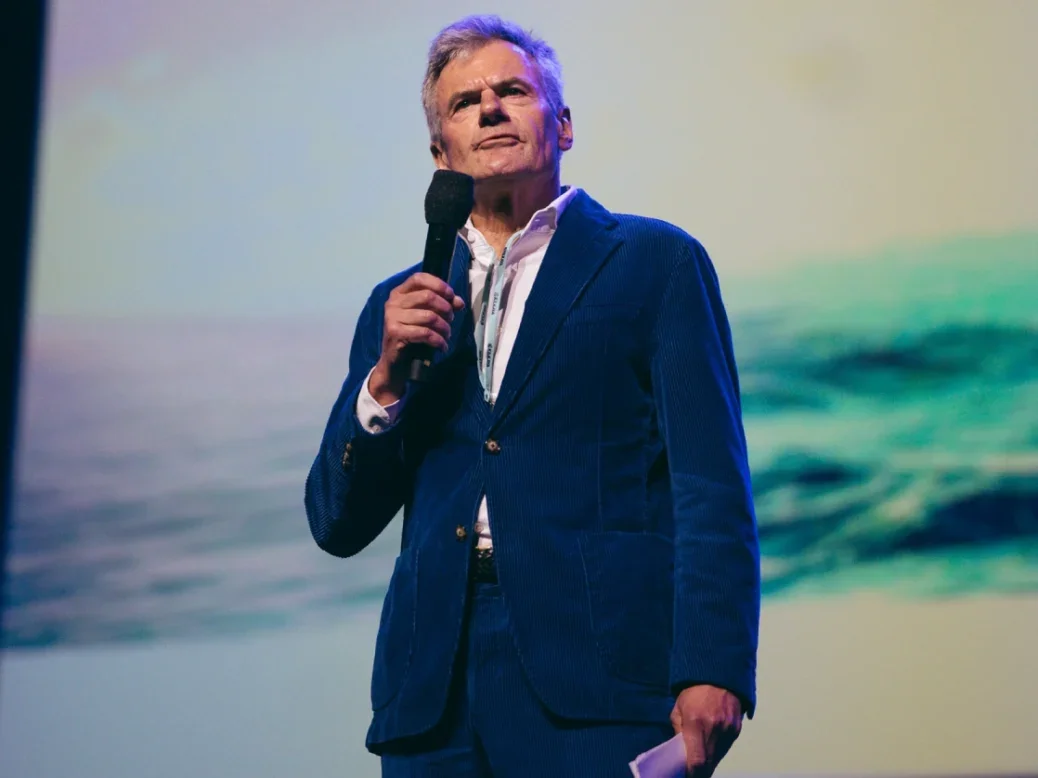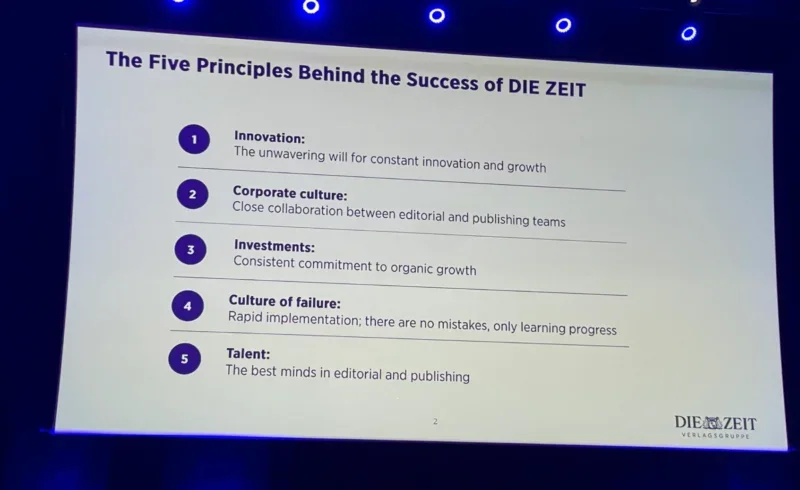
German weekly newspaper Die Zeit has gone “from misery to paradise” in the past 25 years by building an “ecosystem” around its core brand.
Revenue at Die Zeit has quadrupled by 320% since 1999 from €74m to €311m and it has gone from being €5m in the red to profitable.
Dr Rainer Esser, who became chief executive in 1999, told the WAN-IFRA World News Media Congress in Krakow that 60% of subscriptions at Die Zeit are now digital, a source of “good profitability”.
He added that Die Zeit’s circulation is at an “all-time high” with 636,000 copies sold. The newspaper comes out each Thursday.
But Esser said they also built “an ecosystem around our core values, trust, quality” and brand insight with the addition of 19 magazines (with subscriptions totalling 350,000), 130 events and conferences, jobs boards to keep hold of classifieds advertising, and businesses in content marketing and travel.
Esser said the company has invested in organic growth rather than acquiring new companies. And he advised other media businesses to invest in more editors so they can develop more products. Editorial staff under Esser at Die Zeit have increased from 100 to 600.
He said the aim is to reach 1.2 million subscribers within a few years and confessed that Die Zeit has begun copying The New York Times in its bundle strategy to help get there.
The German title launched a games vertical, then podcasts, with cooking set to come soon – all products that are also part of an NYT bundle.
Esser noted that Die Zeit has come “a long way from a traditional newspaper to a multi-faceted media group. We reach every month 20 million individuals in Germany, which means we are some kind of mass media.”
Esser shared his five principles behind the success of Die Zeit’s transformation: innovation, corporate culture, investment, culture of failure and talent.

He described innovation as “the most important one… innovate and grow, or die.
“I ask you briefly with which alternative you can excite your people more. You tell them ‘well, this year will be a great year. We will cut down our costs by 20%. We will lay off 20% of all jobs’. Yeah, that’s great. The second alternative is we tell them this year we will grow. We will launch new, exciting products, and if we need more people for this, we will hire them. Of course, alternative two…”
He gave the example of launching podcasts in 2015 and claimed Die Zeit’s 27 audio products now get 20 million downloads per month compared to 2-3 million for competitors.
Esser said the “anarchic” podcast strategy had fit into the fourth principle of success around a culture of failure.
Zeit Online editor-in-chief Jochen Wegner asked everyone in the company who wanted to start a podcast. Esser said: “Production costs are pretty low. So a lot of hands [went] up and we started a lot of podcasts. A lot of them succeeded. Some did not. And now we’re the first company in Germany to introduce a podcast subscription to monetise the big reach of all these podcasts.”
He also said: “A lot of companies where something doesn’t work out, they nail you against the wall. That’s pinpointing who is responsible for it. If at Die Zeit somebody is not successful, we embrace him, we give him a hug, and then we try all together to make this story a successful story. There are no failures. There are no mistakes. There are only procedures which can finally lead to a success.
“Sometimes it takes a bit longer. The only mistake, the only failure we can do, is do nothing. Stagnation: this is a failure. We always have to seek to grow.”
Other areas of growth have been new sections covering psychology, finance, family, and a “purpose” column investigating questions of meaning and life. Producing more online data journalism has proved to be the biggest source of new subscribers.
Of the fifth principle, the talent, Esser said Die Zeit “actively sought people who are skilled and team workers. What we do at Die Zeit is not rocket science, it’s just skilful work, so we need skilled people who are ambitious and, above all, who are very good team workers.”
He added that they often do this by hiring people directly from university to train them. “The most important [way] to attract young talents and to keep young talents is to give them, very soon, new projects for which they are responsible.”
Email pged@pressgazette.co.uk to point out mistakes, provide story tips or send in a letter for publication on our "Letters Page" blog

